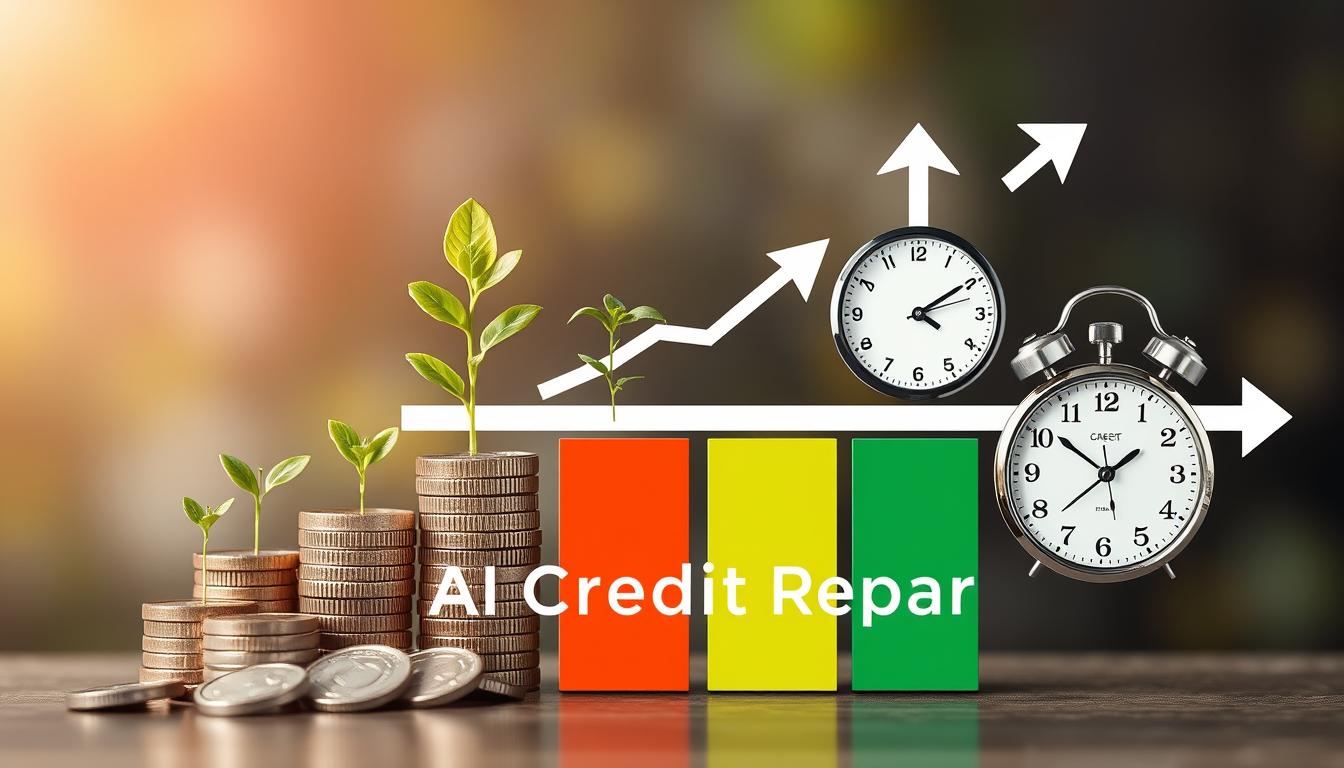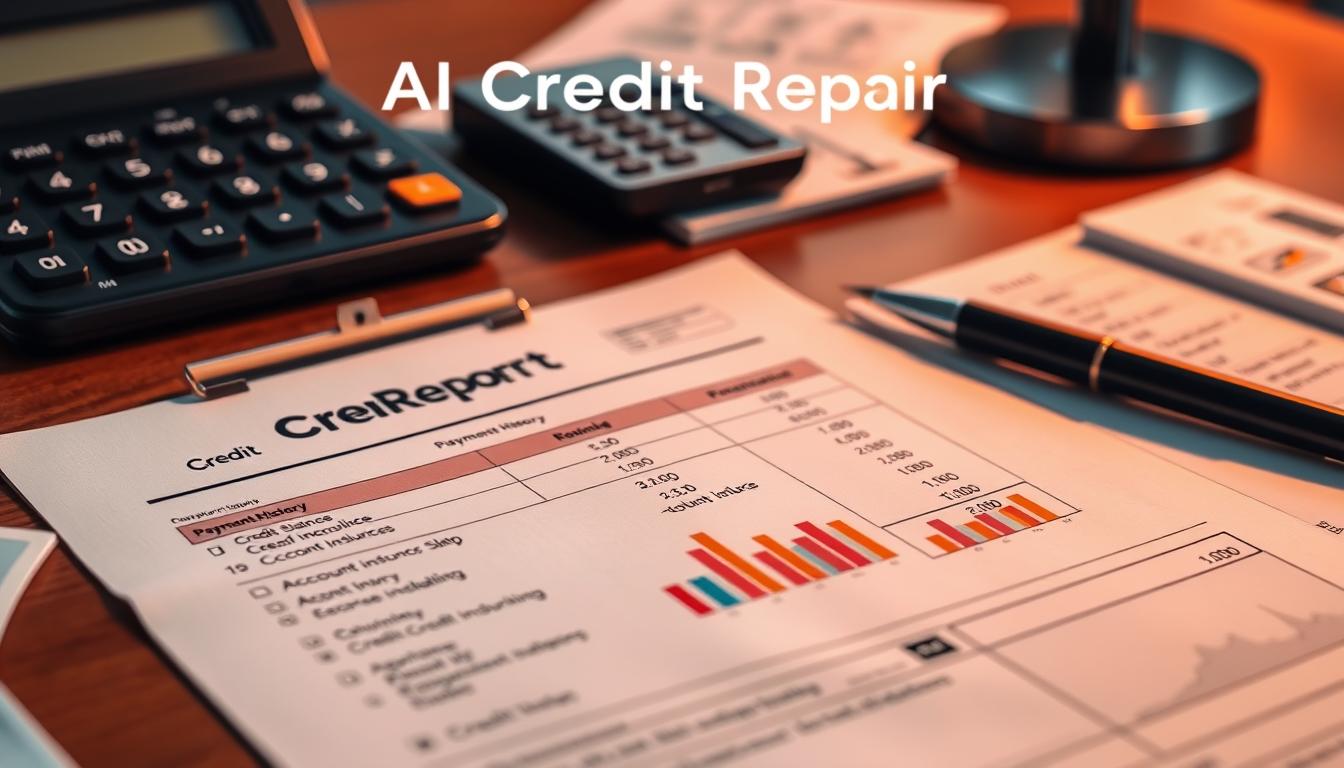Bankruptcy can be a tough financial hurdle. But understanding how to rebuild your credit score is key. This guide will help you navigate the path to financial recovery.
We’ll explore factors that affect credit score improvement after bankruptcy. You’ll also learn strategies to speed up the rebuilding process.
Key Takeaways
- Bankruptcy can have a significant impact on your credit score, but the extent and duration of the effect vary depending on the type of bankruptcy filed.
- Factors such as payment history, credit utilization, and the age of credit accounts all play a role in determining how quickly your credit score can recover.
- Developing responsible credit management habits, including making timely payments and maintaining low credit utilization ratios, is crucial for rebuilding your credit after bankruptcy.
- Regularly monitoring your credit reports and addressing any errors or inaccuracies can also help accelerate the credit score recovery process.
- Seeking professional credit repair services may be beneficial in certain cases, particularly if you face challenges in effectively managing your credit on your own.
Understanding the Impact of Bankruptcy on Credit Scores
Bankruptcy can significantly affect your credit score. The impact varies based on the type of bankruptcy filed. Knowing how different bankruptcies affect your credit helps in rebuilding your score.
Types of Bankruptcy and Their Effects
Chapter 7 and Chapter 13 are the most common bankruptcy types. Chapter 7, or “liquidation bankruptcy,” often has a more severe impact on credit scores.
It involves selling non-exempt assets to pay off debts. Chapter 13, or “reorganization bankruptcy,” allows for a repayment plan over time.
This type usually results in a less dramatic credit score drop.
Factors Affecting Credit Score Recovery
Credit score recovery after bankruptcy depends on several key factors. These include your financial situation’s severity and your credit history before bankruptcy.
Your financial management after filing also plays a crucial role. People with strong credit histories may recover faster than those with complex financial pasts.
| Factor | Impact on Credit Score Recovery |
|---|---|
| Bankruptcy type (Chapter 7 or Chapter 13) | Chapter 7 typically has a more severe and longer-lasting impact on credit scores compared to Chapter 13. |
| Credit history prior to bankruptcy | Individuals with a strong credit history before the bankruptcy may experience a faster credit score recovery. |
| Responsible financial management after bankruptcy | Developing positive financial habits, such as making on-time payments and maintaining low credit utilization, can accelerate credit score improvement. |
Knowing bankruptcy types and recovery factors helps in rebuilding credit after filing. This knowledge guides individuals through the process of improving their credit scores.
The Credit Score Rebuilding Timeline
Rebuilding your credit score after bankruptcy takes time. The process varies for Chapter 7 and Chapter 13 bankruptcies. Key milestones can show your progress along the way.
After bankruptcy discharge, your credit score may drop significantly. This is normal, as bankruptcy leaves a negative mark. However, its impact will lessen over time.
Your credit score will slowly improve as you open new accounts. Within the first year, you may see a modest increase. This upward trend will continue in the following years.
After 2-3 years, you may regain a significant portion of your credit score. You’ll likely qualify for better interest rates and credit terms. This makes it easier to rebuild your financial health.
The exact recovery timeline depends on your bankruptcy type and financial habits. Consistent, responsible credit behavior is key to faster rebuilding.

Understanding the typical timeline helps set realistic goals. With patience and the right strategies, you can regain your financial footing. You can achieve your objectives through disciplined credit score recovery.
Strategies for Improving Your Credit Score After Bankruptcy
Rebuilding your credit score after bankruptcy requires a strategic approach. You can lay the foundation for long-term credit health by building a positive payment history. Maintaining low credit utilization ratios is also crucial for achieving your financial goals.
Building a Positive Payment History
Establishing a consistent, positive payment history is key to improving your credit score. Make all your payments on time, even for small bills. This shows lenders you’re reliable.
Consider secured credit cards or credit-builder loans to start building credit. These options require a deposit but help demonstrate responsible usage. Becoming an authorized user on someone else’s credit card can also boost your score.
Maintaining Low Credit Utilization Ratios
Credit utilization is the amount of credit you’re using compared to your total available credit. Keeping your credit utilization below 30% shows financial responsibility. Pay down outstanding balances on your credit cards and other revolving accounts.
Request credit limit increases from your card issuers. This can lower your utilization ratio without increasing your debt. Avoid opening new credit accounts, as this can temporarily increase your credit utilization.
By focusing on these strategies, you can take meaningful steps toward improving your credit score after bankruptcy. Building credit after bankruptcy and managing credit utilization after bankruptcy are crucial for financial recovery.
“Rebuilding your credit after bankruptcy takes time and discipline, but it’s a worthwhile investment in your financial future.”
The Role of Credit Reports in Credit Score Recovery
Credit reports are vital for rebuilding your creditworthiness after bankruptcy. Regular monitoring helps address errors that impact your credit score. Let’s explore credit report monitoring and how to dispute discrepancies.
Monitoring Your Credit Reports
Keeping an eye on your credit reports is crucial for post-bankruptcy financial health. Review reports from Experian, Equifax, and TransUnion to spot incorrect information. This helps you address issues quickly and rebuild your credit.
Disputing Errors and Inaccuracies
It’s important to dispute any errors you find on your credit reports. These could range from wrong account details to fraudulent activity. Disputing issues prompts credit bureaus to investigate and fix problems.
This process can improve your credit reports’ accuracy and boost your score recovery. By taking action, you can speed up your credit recovery journey.
To dispute errors, follow these steps:
- Review your credit reports thoroughly to identify any discrepancies.
- Gather supporting documentation to substantiate your claim.
- Contact the credit bureau(s) directly, either online, by mail, or by phone, to initiate the dispute process.
- Monitor the progress of your dispute and ensure the credit bureau(s) resolve the issue in a timely manner.
Stay alert and take steps to keep your credit reports accurate. This can speed up your credit score recovery after bankruptcy. You’ll regain control of your financial future faster.

How Soon Will My Credit Score Improve After Bankruptcy?
Credit score improvement after bankruptcy varies based on several factors. The journey to rebuilding your credit can be challenging, but it’s achievable. Your score may start improving within 6-12 months of bankruptcy discharge.
The timeline depends on bankruptcy type, pre-bankruptcy credit history, and your actions to establish good payment records. Chapter 7 bankruptcy may lead to quicker improvement compared to Chapter 13.
| Bankruptcy Type | Typical Credit Score Improvement Timeline |
|---|---|
| Chapter 7 | 6-12 months |
| Chapter 13 | 12-24 months |
Remember, the timeline isn’t fixed. Your unique situation and efforts will shape your credit recovery journey. Focus on responsible credit management to speed up the process.
Make timely payments and keep credit utilization low. Regularly check your credit reports. With patience and dedication, you can regain financial stability and achieve your credit goals.
The Importance of Responsible Credit Management
Rebuilding your credit score after bankruptcy requires a long-term commitment to responsible credit management. By following best practices, you can speed up your credit recovery. This approach will help you achieve financial stability.
Timely payments are crucial for credit management strategies after bankruptcy. Payment history greatly impacts your credit score. Make sure to pay all bills on time, including credit cards and loans.
Keeping low credit utilization ratios is vital for responsible credit management after bankruptcy. Experts suggest maintaining credit card balances below 30% of your limit. This shows responsible borrowing behavior.
Diversifying your credit mix can boost your credit score recovery. Have a blend of different credit types, like cards, installment loans, and mortgages. This proves to lenders that you can manage various credit forms responsibly.
“The path to credit score recovery after bankruptcy is paved with consistent, disciplined credit management. By making timely payments, keeping balances low, and diversifying your credit mix, you can regain financial stability and rebuild your credit over time.”
Remember, responsible credit management after bankruptcy is a marathon, not a sprint. Stay committed to these best practices. This approach will set you up for long-term financial success.

Rebuilding Credit After Chapter 7 Bankruptcy
Recovering from Chapter 7 bankruptcy is challenging, but not impossible. With determination and strategy, you can rebuild your credit. Let’s explore timelines and strategies for rebuilding credit after chapter 7 bankruptcy and credit score recovery after chapter 7 bankruptcy.
Timeline and Tips for Recovery
Credit recovery after Chapter 7 bankruptcy is a gradual process. With the right steps, you can make significant progress. Here’s a general timeline and tips to guide you:
- Immediate Action (0-6 months): Get a free credit report and identify any errors. Dispute these issues with credit bureaus to ensure accuracy.
- Building Credit History (6-12 months): Apply for a secured credit card or become an authorized user. This helps build a positive payment history.
- Increasing Credit Limits (12-24 months): Request credit limit increases on existing accounts. This improves your credit utilization ratio, a key credit score factor.
- Diversifying Credit Mix (24+ months): Apply for different types of credit, like an installment loan. This shows your ability to manage various accounts.
Patience and responsible credit management are crucial when rebuilding credit after chapter 7 bankruptcy. Follow these steps and maintain a positive payment history. This will help improve your credit score and regain financial stability.
The timeline for credit score recovery can vary based on individual circumstances. Factors include bankruptcy severity and overall credit history. Seeking guidance from a financial advisor can be valuable.
Rebuilding Credit After Chapter 13 Bankruptcy
Chapter 13 bankruptcy offers a unique path to credit score recovery. It involves a 3-to-5-year repayment plan for a portion of your debts. This process impacts your credit score but provides chances to rebuild over time.
During Chapter 13, you make regular payments to creditors. This helps establish a positive payment history, crucial for your credit score. As you pay down debts, your credit utilization ratio decreases, improving your standing.
- Maintain consistent, on-time payments throughout your Chapter 13 repayment plan to demonstrate responsible credit management.
- Avoid taking on new debt during this time, as it can impact your ability to make your scheduled payments.
- Monitor your credit reports regularly to ensure accuracy and address any errors or inaccuracies.
Credit recovery after Chapter 13 bankruptcy may be slower. Stay disciplined and focused on rebuilding your credit over time. Follow best practices and use the unique aspects of Chapter 13.
You can rebuild your credit after chapter 13 bankruptcy and recover your credit score. This approach sets you up for long-term financial success.

“Rebuilding credit after a Chapter 13 bankruptcy requires patience and diligence, but the end result can be a stronger, more resilient financial future.”
The Impact of Negative Credit Information on Scores
Negative credit information can seriously hurt your credit score. Bankruptcies and late payments are examples of such information. Understanding how credit scoring works is key to rebuilding your creditworthiness after financial troubles.
Understanding Credit Score Calculation
Credit scoring models use complex algorithms to determine your credit score. They consider factors like payment history, credit use, and credit history length. These models also look at negative information on your credit report.
Negative credit information, such as bankruptcy filings, can greatly lower your score. A bankruptcy can cause a big drop in your score. This impact usually lasts for 7-10 years, depending on the bankruptcy type.
The exact effect of negative information on your score can vary. It depends on the item’s severity and your overall credit profile. How recent the negative information is also plays a role.
To lessen the long-term impact, focus on rebuilding your credit responsibly. Make timely payments and keep credit use low. Regularly check your credit reports for errors that could be lowering your score.
When to Consider Professional Credit Repair Services
Rebuilding credit after bankruptcy can be complex and time-consuming. Professional credit repair services can help you navigate this journey. They can identify errors on your credit reports and create a plan to boost your creditworthiness.
These services are useful if you’re struggling to understand credit scoring. They can provide expert guidance and personalized strategies. This help can speed up your financial recovery after bankruptcy.
Credit repair companies can also tackle errors on your credit reports. They have resources to challenge inaccuracies effectively. This is helpful if you’ve tried disputing errors without success.
Professional help is great for those with limited time. It’s also useful if you lack confidence in handling credit disputes. Their expertise can make the process smoother and more efficient.

